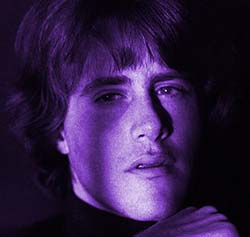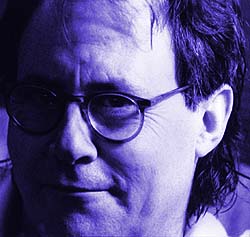
While the Bubblegum Rock movement has been critically lambasted for 30 years, its importance is undeniable. At a time in the 60's when Merseybeat and garage bands had broken up or turned hippie, pre-fab studio groups like The Monkees, The Archies, The 1910 Fruitgum Company ("Simon Says") and The Ohio Express created many beautifully crafted songs, carrying the torch of pure, simple pop/rock into the 70's, where it was picked up by bands like The Raspberries, The Shoes and The Rubinoos, or in the UK got dressed up by The Sweet and other glam rockers. Later, punk bands like Funhouse, Slaughter & The Dogs and Joan Jett all paid a debt to their three-chord Bubblegum forebearers by covering some of Levine's handiwork.
Getting involved in commercial jingles in the 70's, native New Yorker Levine still works in the field, and currently heads up three music companies, Crushing Music, Crushing Underground and Levine & Company.

The man who invented a genre: Joey Levine in his Third Rail days.
LCD: What's your background as a musician?
LEVINE: My dad Elli Levine was a band leader in the Army and a jazz pianist under the name Elden Lewis, and my mother Marion Kingsley was a singer who had her own radio show in NYC when she was 16 years old. My uncle Alan Stanton was a record producer at Columbia and A&M. I took piano and guitar, and did the whole teenage band kind of things. My first band was Joey Vine & The Grapes, I was in The Pastels, playing country clubs and synagogues and sweet 16 parties...
LCD: How did you get involved with the whole NYC Bubblegum rock scene?
LEVINE: I had been working in music publishing for a couple years over at TM Music, writing songs after school, where I met a songwriter named Artie Resnick, who had written 'Under The Boardwalk.' We really collaborated well, and were getting success off of some demos we were cutting. Jerry Kasenetz and Jeff Katz had heard a song I wrote called 'Try It' that The Standells had a kinda mini-hit underground thing that people were digging on, and then they recorded it with The Ohio Express after 'Beg Borrow & Steal.' They called me and said, 'We've been hearing your demos and this and that and we think you can write some of this teenybopper music,' and then Artie & I wrote 'Yummy Yummy.'
LCD: How old were you when this was all happening
LEVINE: Just about 17.
LCD: Wow. How was it working for Katsentz/Katz? Was it a hit factory or did you have a lot of creative freedom?
LEVINE: Well, it was a factory in that there were a couple of different bands that we used-a lot of times it would be the same band-and we had a day to record and a day to do overdubs and mix. Also, when Jeff and Jerry thought a song was a hit and it didn't fly, they'd have other bands record it again, slightly different. They'd have The Ohio Express do it, then The Shadows of Knight, then The Fruitgum Company, on and on. So you'd work all week, and in-between you'd write more songs.
LCD: Were the Ohio Express and 1910 Fruitgum Company real bands? Did they tour?
LEVINE: They were all real bands, but I sang on a lot of their records. Neil Bogart [Buddha Records President and the man who later gave the world KISS & Donna Summer] heard my demo of 'Yummy Yummy' and said 'Have this guy sing on the records.'
LCD: That's why on the Ohio Express albums you have the hits with you singing and then the other tracks sound like bad Procol Harum rip-offs.
LEVINE: Yeah. When the bands would tour I'd stay in New York and these guys would schlep out around the country singing my songs, though they didn't sound like me.
LCD: What are your memories of those days?
LEVINE: It was great. I had Top 10 records, my voice was all over the radio, but nobody knew who I was unless I wanted them to. The best kind of fame. It got me into a lot more parties at school, for sure.
LCD: Studio songwriters produced some of the best pop songs of the 60's. Name some songs you and Artie Resnick wrote from back then.
LEVINE: Oh, God, so many. Besides all The Ohio Express stuff, we wrote some stuff for The 1910 Fruitgum Company, me and Bobbie Blum and Bo Gentry and Richie Cordell. 'Gimme Gimme Good Lovin',' Tommy James stuff like 'Mony Mony,' 'Montego Bay,' lots of stuff. You lost track you worked so much, and a lot of times we co-wrote and never gave each other credit. I also wrote stuff for Gene Pitney with Doc Pomus.
LCD: A lot of people interpret songs like "Yummy Yummy" and "Chewy Chewy" as being slyly sexual. Was that your intent?
LEVINE: Absolutely. We were told to write these innocent songs, keep it young and poppy, but we were all in our late teens so we wanted to slide some double entendres past 'em if we could. Eating was our big thing.
LCD: The Ramones have mentioned numerous times that they started out wanting to sound like The Ohio Express. How does it feel to be a godfather of Punk?
LEVINE: [Buddha Records publicist/New York Dolls manager] Marty Thau was producing some punk bands back in the 70's, and he said 'You should produce this stuff-all these guys mention your records.' To tell you the truth, even though in the 60s we were all in our own funky state, meeting these bands-I just couldn't deal. It was too weird for me.
LCD: Why do you think critics trash the whole bubblegum scene?
LEVINE: Well, the music's a little contrite. It was just played for fun, and it was a period of time that was very serious. People were looking for big, heavy themes-drugs, war, revolution - and it looked very thin under those criteria. Bubblegum to me was making fun of all that. Basically it was like, 'We get the serious issues - so why not smile and dance and goof around?'
LCD: Tell me about Third Rail.
LEVINE: The Third Rail I did before I was in The Ohio Express. I was 16 or 17. It was me, Artie and Kris Resnick, some of the earliest songs we wrote that we recorded together just as songwriters. Very political, more all over the map musically. Teddy Cooper over at Epic heard the stuff we were recording and said, 'Let's do an album.' It just got re-released on CD in Britain.
LCD: The internet says you co-wrote stuff with Jim Carroll. Huh?
LEVINE: That's my friend Jim Carroll. Not the Basketball Diaries junkie poet guy.
LCD: OK. (sigh) Tell me about "Life is a Rock but the Radio Rolled Me"?
LEVINE: That song is imitated a lot I think, by people like REM, with 'The End of The World' and Billy Joel with 'We Didn't Start The Fire.' Not directly, but a lot of songs are based on people's memory of our song. Some guy called me and said [affects dunderhead accent]'I think that's the first rap record!' And I said, 'I don't know about that.' And he said, 'Well, before that you had country rap, and story raps, but just rhythmic rhyming of words flowing together, that was the first!' So I said, 'Look, I'm the father of bubblegum-don't make me the father of rap. Somebody will put me on a hit list.'
LCD: You work exclusively in commercials now. Do you miss writing songs about love as opposed to tampons or fish sticks?
LEVINE: I have never written a song about tampons.
LCD: OK.
LEVINE: The jingle thing is just cleaner, more honest. You write the song, you record it, people hear it, less politics, less rip-offs, the pay is good. No muss, no fuss. I still wrote songs. I write songs for my wife or my kids, but now it's all fun. No headaches and ulcers wondering about having a hit or not.
LCD: What are some of your commercial songwriting credits?
LEVINE: 'Sometimes You Feel Like a Nut' for Peter Paul/Mounds, (singing) 'Oh, What A Feeling to Drive-TOY-OTA!,' 'Can't Beat The Feeling' for Coca-Cola, 'The Softer Side of Sears,' Diet Coke, 'Just For The Taste of It'...
LCD: God. People will carry those jingles with them to their graves. With your pop songs and TV, how does it feel to be so deep in the public consciousness?
LEVINE: Ah, I feel good about it. I feel lucky to be able to do what I do for so long.
LCD: Tell me something people might not guess about Joey Levine?
LEVINE: I always thought of myself as a soul singer.

Joey Levine today.
© 1999 WFMU.
All rights reserved. Reproduction in whole or in part in any form or medium without express written permission of WFMU is prohibited.